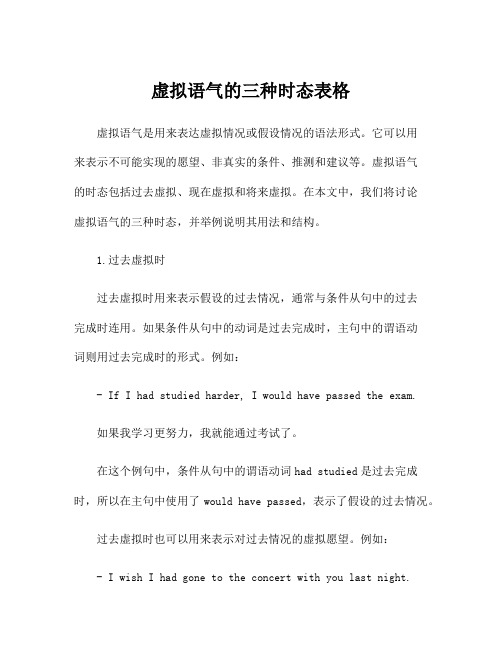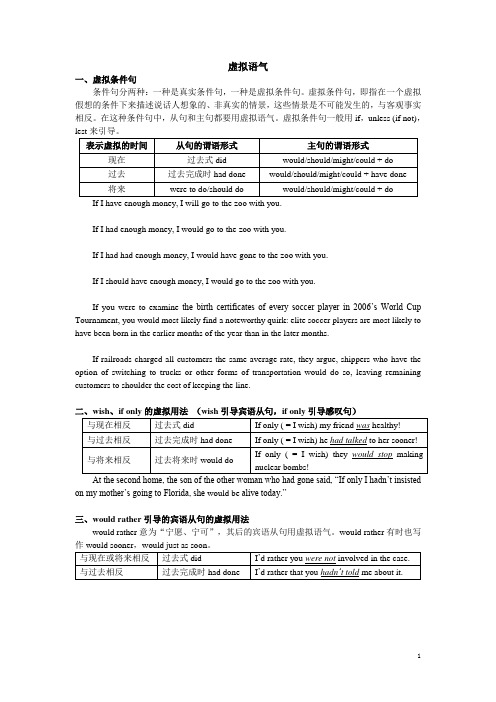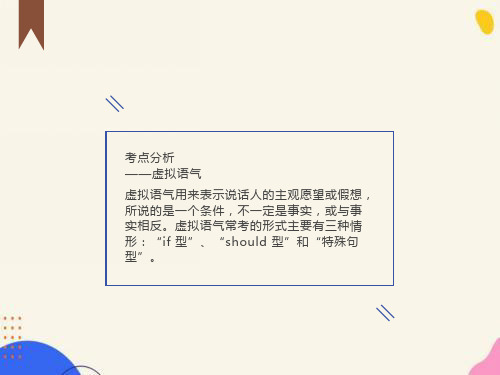2018考研英语语法:常见三种虚拟语气_毙考题
虚拟语气归纳大全

虚拟语气的用法归纳1、虚拟条件句的三种基本类型:与现在事实相反、与过去事实相反、与将来事实相反..条件句有真实条件句和非真实虚拟条件句两种..真实条件句所表示的假设是有可能发生的;而非真实条件句则通常表示一种假想;与事实相反或不大可能会发生:If I have time; I will go with them. 假若我有时间;我就同他们去..陈述语气If I were you; I would go with them. 假若我是你;我就同他们去..虚拟语气▲与现在事实相反若与现在事实相反;条件从句的谓语用过去式be通常用were;主句谓语用“should would; could; might+动词原形”:If I knew her number ;I could ring her up. 要是我知道她的电话号码;我就可以给她打电话了..可惜我不知道▲与过去事实相反若与过去事实相反;条件从句的谓语用过去完成时had+过去分词;主句谓语用“should would; could; might+have+过去分词”:If I’d left sooner;I’d have been on time. 要是我早点动身;我就准时到了..但我动身太迟了▲与将来事实相反若与将来事实相反;条件从句的谓语用过去式be通常用were;主句谓语用“should would; could; might+动词原形”:If I asked him;I’m sure he’d help us. 如果我向他提出要求;肯定他会帮助我们..不过我不打算这样做注:几点特别说明① 主句谓语中的should主要用于第一人称后..would; might; could的大致区别是:would表示结果;might表示可能性;could表示能力、允许或可能性..比较:If you tried again ;you would succeed. 要是你再试一试;你就会成功的..would表结果If you tried again; you might succeed. 要是你再试一试;你可能会成功的..might表可能If you tried again ;you could succeed. 要是你再试一试;你就能成功了..could表能力④ 对于与将来事实相反的情形;请注意以下几点:一是这里说的与将来事实相反;实为对将来情况的推测;二是此用法中的条件从句谓语除用过去式外;有时也用“should+动词原形”表示可能性极小;常译为“万一”或“were to+动词原形”表示与将来事实相反的假设;三是当条件从句使用“should+动词原形”这样的谓语时;主句谓语除可用“should would; could; might+动词原形”这样的虚拟语气外;也可用直陈语气或祈使语气:If it should rain tomorrow; don’t expect me. 万一明天下雨;就不要等我了..祈使语气If I should see him; I’ll tell him. 万一我见到他;我就告诉他..直陈语气2、错综时间虚拟条件句所谓错综时间虚拟条件句即条件从句与主句所指时间不一致;如从句指过去;而主句即指的是现在或将来;此时应根据具体的语境情况;结合上面提到的三种基本类型对时态作相应的调整:If it had rained last night; the ground would be wet now. 要是昨晚下过雨的话;现在地面就会是湿的..You would be much better now if you had taken my advice. 假若你当时听我的话;你现在就会好多了..3、两个常考虚拟语气句型▲句型介绍这两个句型是If it weren’t for…和If it hadn’t been for…;这是两个很常用的虚拟语气句型;也经常受到命题人的青睐;其意为“若不是有”“要不是有”..如:If it weren’t for water; no plant could grow. 要是没有水植物就无法生长..If it hadn’t been for your assistance ;we wouldn’t have succeeded.=But for your assistance ;we wouldn’t have succeeded.=Without your assistance ;we wouldn’t have succeeded.5、wish后宾语从句用虚拟语气▲用法说明动词wish后接宾语从句时;从句谓语要用虚拟语气..若要表示与现在事实相反的愿望;从句谓语用一般过去时或过去进行时;若表示与过去相反的愿望;从句谓语用过去完成时或would / could+have +过去分词;若表示将来没有把握或不太可能实现的愿望;用would could +动词原形..如:注:特别注意从句的时态只与从句所指的时间有关;而与wish的时态无关;比较:I wish I were rich. 要是我现在有钱就好了..I wish I had been rich. 要是那时我有钱就好了..I wished I were rich. 当时我后悔自己没有钱..I wished I had been rich. 当时我后悔自己曾经没有钱..6、if only后的句子用虚拟语气if only 与 I wish一样;也用于表示与事实相反的愿望;其后所虚拟语气的时态与 wish 后所接时态的情况相同:If only she had had more courage 她再勇敢一些就好了..If only I had listened to my parents 我要是当时听了父母的话就好了..If only she would go with me 她要是愿意和我一道去就好了注:if only 通常独立使用;没有主句..7、as if though 从句用虚拟语气▲基本用法以as if as though引导的方式状语从句或表语从句;有时用虚拟语气;若表示与现在事实相反;谓语动词用一般过去时;若表示与过去事实相反;用过去完成时;表示将来的可能性不大;用would might; could+动词原形:He acts as if he knew me. 他显得认识我似的..They treat me as though I were a stranger. 他们待我如陌生人..He talks as if he had been abroad. 他说起话来好像曾经出过国..注:两点说明1从句所表示的内容若为事实或可能为事实;也可用陈述语气:It looks as if we’ll be late. 我们似乎要迟到了..2注意It isn’t as if…的翻译:It isn’t as if he were poor. 他不像穷的样子或他又不穷..8、It’s time后的从句用虚拟语气▲基本用法从句谓语通常用过去式表示现在或将来;有时也用过去进行时或“should+动词原形”较少见;且should不能省略;其意为“早该干某事了”:It’s time we went were going; should go. 我们该走了..It’s time I was in bed. 我该上床睡了..不用were9、would rather后句子用虚拟语气在would rather; would sooner; would just as soon 后的that从句中; 句子谓语习惯上要用虚拟语气; 表示”宁愿做什么” ;具体用法为:▲一般过去时表示现在或将来的愿望I’d rather you went tomorrow now. 我宁愿你明天现在去..▲用过去完成时表过去的愿望I’d rather you hadn’t said it. 我真希望你没有这样说过..10、宾语从句用虚拟语气的10种类型▲ I wish后的宾语从句动词wish后接宾语从句时;从句谓语要用虚拟语气..若要表示与现在事实相反的愿望;从句谓语用一般过去时或过去进行时;若表示与过去相反的愿望;从句谓语用过去完成时或would / could+have +过去分词;若表示将来没有把握或不太可能实现的愿望;用would could +动词原形..如:I wish I could be of some use. 我希望我能有什么用处..We wish he didn’t smoke. 我们希望他不吸烟..I wish prices would come down. 我希望物价能降下来..▲表示“坚持”后的宾语从句主要是指insist的宾语从句;从句谓语由“should+动词原形”构成;其中的should在美国英语中通常可以省略..如:I insisted that he should stay. 我坚持要他留下..注:动词insist后接宾语从句时;除可用虚拟语气外;也可用陈述语气;两者的区别是:若谓语动词所表示的动作尚未发生;或尚未成为事实;则用虚拟语气;若谓语动词所表示的动作已经发生;或已经成为事实;则要用陈述语气..比较:He insisted that I had read his letter. 他坚持说我看过他的信..He insisted that I should read his letter. 他坚持要我看他的信..▲表示“命令”后的宾语从句主要是指order; command的宾语从句;从句谓语由“should+动词原形”构成;其中的should在美国英语中通常可以省略..如:He ordered that it should be sent back. 他命令把它送回去..▲表示“建议”后的宾语从句主要是指advise; suggest; propose; recommend等的宾语从句;从句谓语由“should+动词原形”构成;其中的should在美国英语中通常可以省略..如:He suggested that we should leave early. 他建议我们早点动身..注:与动词insist相似;动词suggest后接宾语从句时;除可用虚拟语气外;也可用陈述语气;两者的区别也是:若谓语动词所表示的情况尚未成为事实;则用虚拟语气;此时suggest 通常译为“建议”;若谓语动词所表示的情况为既成事实;则要用陈述语气;此时的suggest 通常译为“表明”、“认为”..比较并体会:He suggested that we should stay for dinner. 他建议我们留下吃饭..I suggested that you had a secret understanding with him. 我觉得你与他心照不宣..▲表示“要求”后的宾语从句主要是指ask; demand; require; request等后的宾语从句;从句谓语由“should+动词原形”构成;其中的should在美国英语中通常可以省略..如:I ask that he leave. 我要求他走开..He requires that I should appear. 他要求我出场..▲表示“提议”“投票”后的宾语从句主要是指move; vote等后的宾语从句;从句谓语由“should+动词原形”构成;其中的should在美国英语中通常可以省略..如:I move that we accept the proposal. 我提议通过这项提案..▲表示“敦促”后的宾语从句主要是指动词urge后的宾语从句;从句谓语由“should+动词原形”构成;其中的should 在美国英语中通常可以省略..如:He urged that they go to Europe. 他敦促他们到欧洲去..▲表示“安排”后的宾语从句主要是指动词arrange后的宾语从句;从句谓语由“should+动词原形”构成;其中的should在美国英语中通常可以省略..如:He arranged that I should go abroad. 他安排我去国外..▲表示“希望”“打算”后的宾语从句主要是指动词desire; intend后的宾语从句;从句谓语由“should+动词原形”构成;其中的should在美国英语中通常可以省略..如:She desires that he do it. 她希望他做此事..▲表示“指示”后的宾语从句主要是指动词direct后的宾语从句;从句谓语由“should+动词原形”构成;其中的should在美国英语中通常可以省略..如:The general directed that the prisoners should be set free. 将军指示释放那些俘虏..11、主语从句中的虚拟语气在It is necessary;important;strange;natural; advisable; anxious; compulsory; crucial; desirable; eager; essential; fitting; imperative绝对必要; impossible; improper; obligatory; possible; preferable; probable; recommended; urgent; vital etc. ;it is a pity;It is requested/suggested/desired/proposed等结构后的主语从句中要用虚拟语气;即Should+动词原形或只用动词原形..如:▲It’s important…类这一类型主要包括It is was important necessary; desirable; imperative; advisablethat. . .句型..如:It is impossible that he should go home. 他不可能会回家去..▲It’s a pity…类It is a pity that she should fare so badly. 她竟吃得这么差;真可怜..▲It’s desired…类这种主语从句还常用在It is was desired suggested; settled; proposed; requested; decided; etc. that...句型..如:It is requested that a vote be taken. 建议付诸表决..12、表语从句、同位语从句中的虚拟语气在advice; agreement; command; decision; decree; demand; determination; indication; insistence; order; preference; proposal; request; requirement;stipulation ;suggestion; idea;plan;order等名词后的表语从句、同位语从句中要用虚拟语气;即should+动词原形或只用动词原形..如:Our suggestion is that you shouldbe the first to go.我们的建议是你应该第一个去..13、在 lest ;for fear that 以免 ; in case 以防引导的目的状语从句中的虚拟语气在 lest ;for fear that 以免 ; in case 以防从句中用should+动词原形; should 可以省略.She walked quietly lest she should wake up her roommates. 她走得很轻以免吵醒虚拟语气表示一种假设的情况;或一种主观的愿望;即动词所表示的动作或状态并非事实;或不可能实现..英语虚拟语气的形式有下列几种:If I were you; I would give up drinking immediately.If I were to see her tomorrow; I would tell her thetruth.If you went there next time; you would see what I mean.country.四、虚拟语气的几种特殊用法省掉if的条件从句结构:Had you asked me; I would have told you. =If you had asked me;…2.有时虚拟条件不用条件从句而用不定式、分词、介词、名词、连接词或定语从句来表示;如:A true friend would not do such a thing.=If he were a true friend; he...=If there were no water;…=If you hadn’t helped me;…3. 有时条件从句中的动作和结果从句中的动作发生的时间不一致;如:If he had followed the doctor’s advice; he would be quite all right now.If I were you; I would have gone home.五、虚拟语气的其他用法He suggested that they should stop smoking.上述动词的名词形式出现时;that 引导的从句仍用虚拟语气..He made a request that they should stop smoking.如果that 引导的从句所表达的内容是事实;也可用陈述语气..He insists that he is right.It is right that you should have done your homework.I wish I had never stopped teaching. =I am sorry I stopped teaching.I wish they’d let us get some sleep.注意:wish与hope接宾语从句的区别在于:hope表示一般可以实现的希望;宾语从句用陈述语气..wish表示很难或不大可能实现的希望;宾语从句用虚拟语气..试比较:1 We hope they will come;We don’t know if they can come.2 We wish they could come;We know they are not coming.4、as if; as though; wouldhad ratherthat引导的从句须用虚拟语气;如:He acts as if nothing had happened.I would rather you didn’t tell him.5、It’s high time that…+动词过去式或should+动词原形;如:It’s time that you had a hair cut.It’s high time that we took some action.。
2019考研英语语法解析:虚拟语气(3)_毙考题

2019考研英语语法解析:虚拟语气(3)_毙考题2019考研英语语法解析:虚拟语气(3)三、混合虚拟语气有时主句和从句的谓语动词指不同的时间,这时需要用混合虚拟语气。
一般来说,在这种情况下,主从句谓语动词指代的时间不同,所以我们又可以错综时间条件句,在这种虚拟情况,动词形式应根据实际情况灵活使用,在做这些题目时候尤其要注意每道题目的提示语:时间状语。
绝大多数情况下,从句或者主句都有相关的时间状语,这是我解题的关键。
If you that late movie last night, you wouldn t be so sleepy.A. haven t watchedB. didn t watchC. hadn t watchedD. wouldn t have watched 答案选C。
Many dead would now be alive if they have not attempted to return for something.Had Paul received six more votes in the last election, he would be our chairman now.混合虚拟语气还有一种情况就是事实和虚拟假设的混合句,这样的句子不仅仅是时间的不同,而重要是事实和假设的混合。
I would have gone to visit him in the hospital had it been at all possible, but I was fully occupied the whole of last week.该句前半部分是假设虚拟,而后半部分是事实的陈述。
Your math instructor would have been happy to give you a make-up examination had you gone and explained that your parents were ill at the time.该句前半句用的是假设虚拟,后半句主句也用的是假设虚拟(如果你去并且解释的话),但是后半句的从句用的是事实语气,因为父母病了是客观事实,故不需要用虚拟形式had been。
虚拟语气的三种时态表格

虚拟语气的三种时态表格虚拟语气是用来表达虚拟情况或假设情况的语法形式。
它可以用来表示不可能实现的愿望、非真实的条件、推测和建议等。
虚拟语气的时态包括过去虚拟、现在虚拟和将来虚拟。
在本文中,我们将讨论虚拟语气的三种时态,并举例说明其用法和结构。
1.过去虚拟时过去虚拟时用来表示假设的过去情况,通常与条件从句中的过去完成时连用。
如果条件从句中的动词是过去完成时,主句中的谓语动词则用过去完成时的形式。
例如:- If I had studied harder, I would have passed the exam.如果我学习更努力,我就能通过考试了。
在这个例句中,条件从句中的谓语动词had studied是过去完成时,所以在主句中使用了would have passed,表示了假设的过去情况。
过去虚拟时也可以用来表示对过去情况的虚拟愿望。
例如:- I wish I had gone to the concert with you last night.我希望昨晚我能和你一起去听音乐会。
在这个例句中,使用了过去虚拟时来表达对已经发生的情况的虚拟愿望。
2.现在虚拟时现在虚拟时用来表示对现在情况的虚拟假设,通常与条件从句中的过去时连用。
如果条件从句中的谓语动词是过去时,主句中的谓语动词则用现在虚拟时的形式。
例如:- If I were you, I would buy that car.如果我是你,我会买那辆车。
在这个例句中,条件从句中的谓语动词were是过去时,所以在主句中使用了would buy,表示了对现在情况的虚拟假设。
现在虚拟时也可以用来表示对现在情况的虚拟愿望。
例如:- I wish my boss were more understanding.我希望我的老板能更理解人。
在这个例句中,使用了现在虚拟时来表达对现在情况的虚拟愿望。
3.将来虚拟时将来虚拟时用来表示对将来情况的虚拟假设,通常与条件从句中的过去将来时连用。
公共英语三级语法学习技巧:虚拟语气

虚拟语气虚拟语气是语言使用中出现的频率比较高的一种语言现象。
同时在各种英语考试中是必考的内容之一。
掌握虚拟语气的关键是要把握它的普通形式的表达和一些特殊形式的表达。
下面以三个经典考题来给予说明。
经典考题1. If the whole operation beforehand, a great deal of time and money would have been lost.A) was not planned B) has not been plannedC) had not been planned D) were not planned2. “You are very selfish. It’s high time you that you are not the most important person in the world,”Tom said to his boss angrily.A) have realized B) should realize C) realize D) realized3. It is essential that these application forms back as early as possible.A) must be sent B) will be sent C) are sent D) be sent考点分析1)普通型虚拟语气即以if引导的主从复合句中的虚拟语气,是虚拟语气谓语动词形式基础,包括与现在事实相反的谓语动词形式,与将来事实相反的谓语动词形式和与过去事实相反的谓语动词形式三种,此三种形式需死记。
从句主句与现在事实相反过去式(be常用were)would/ should/ could/might+动词原形与将来事实相反Should/ wereto+动词原形would/ should/ could/might+动词原形与过去事实相反had+过去分词Would/ should/ could/ mighthave+过去分词解题要诀:切记三种时间的谓语动词形式,特别是与过去事实相反的一类。
考研英语语法之虚拟语气

虚拟语气一、虚拟条件句条件句分两种:一种是真实条件句,一种是虚拟条件句。
虚拟条件句,即指在一个虚拟假想的条件下来描述说话人想象的、非真实的情景,这些情景是不可能发生的,与客观事实相反。
在这种条件句中,从句和主句都要用虚拟语气。
虚拟条件句一般用if,unless (if not),If I had enough money, I would go to the zoo with you.If I had had enough money, I would have gone to the zoo with you.If I should have enough money, I would go to the zoo with you.If you were to examine the birth certificates of every soccer player in 2006’s World Cup Tournament, you would most likely find a noteworthy quirk: elite soccer players are most likely to have been born in the earlier months of the year than in the later months.If railroads charged all customers the same average rate, they argue, shippers who have the option of switching to trucks or other forms of transportation would do so, leaving remaining customers to shoulder the cost of keeping the line.on my mother’s going to Florida, she would be alive today.”三、would rather引导的宾语从句的虚拟用法would rather意为“宁愿、宁可”,其后的宾语从句用虚拟语气。
2018考研英语:虚拟语气在考研英语中的运用

2018考研英语:虚拟语气在考研英语中的运用考研英语中,虚拟语气是一个考点。
虚拟语气用来表示假想,而不表示客观存在的事实,所说的是一个条件,不一定是事实,或与事实相反。
虚拟语气通过谓语动词的特殊形式来表示。
英语中的语气分为陈述语气、祈使语气、虚拟语气三类。
虚拟语气表示说话者做出的假设并非事实,或难以实现的,甚至表达相反的概念。
另外表示主观愿望或表达某种强烈的感情时,也用虚拟语气。
以下是2018考研英语复习中虚拟语气在考研英语中的运用:考研英语中虚拟语气的三种用法一、虚拟语气在状语从句中的运用虚拟语气在状语从句中的运用除了可以表示条件外,还可以表示比较、结果、目的等。
虚拟语气用于表示条件的状语从句中,一般称为虚拟条件句。
根据时间的不同,虚拟条件句中谓语动词时态的变化可能有三种形式,即现在、过去和将来。
二、虚拟语气在主语从句中的运用当it作形式主语,后面用形容词作表语,即在it is + adj.这样的句型中,当描述主语的表语形容词是advisable,critical,crucial,desirable,essential,imperative,important,等形容词时,主语从句的谓语动词多用虚拟语气,如果是现在时,谓语动词用should/would +动词原形(should/would经常省略);如果是过去时,则用should/would + have done的形式。
三、虚拟语气在宾语从句中的运用表示“建议、请求、命令、要求”等主观意向的词(如:suggest、advise、assume、decide、demand、desire、insist、propose、order、recommend、require、suggest ……),引导宾语从句时需用虚拟语气。
虚拟语气中的格式很固定:谓语动词用should+动词原形,should可以省略。
四、虚拟语气在同位语从句中的运用名词advice、assumption、decision、demand、desire、insistence、order、proposal、requirement、recommendation、suggestion……后面若有同位语从句,从句的谓语动词也应使用虚拟语气的形式。
英语中的虚拟语气分析

考点分析 ——非谓语动词
非谓语动词被动式的用法。非谓语动词的被动式的使用前提是判断非谓语动词和逻辑主语在搭配使用时是否具有被动关系,如果是主动关系,就要用前面列出的主动的用法,反之则用被动的用法。例如:
There will be some new buildings to be built up this year.
It is suggested that we (should) hold a meeting next week.
建议下周我们应该开个会。
It is necessary that he (should) come to our meeting tomorrow.
他明天来参加会议是很有必要的。
考点分析 ——非谓语动词
表3-4-3 非谓语动词特性
非谓语动词
特性
不定式
表示将来的动作、一次性的动作
动名词
表示经常性的动作
现在分词
表示主动、正在发生的动作
过去分词
表示被动、完成的动作
考点分析 ——非谓语动词
Hearing the news, they immediately set off for the station.
考点分析 ——虚拟语气 在宾语从句的使用。在表示命令、建议、要求等一类动词(order, suggest, propose, require, demand, request, insist, command, insist)后面的宾语从句中。例如: I suggest that we (should) hold a meeting next week. 我建议我们下周应该开个会。 He insisted that he (should ) be sent there. 他坚持认为应该派他去那里。
虚拟语气

英语语法精讲精练——虚拟语气虚拟语气表示说话人的主观愿望、猜测建议或与事实不符的假设。
虚拟语气可分为三种:(1)一般虚拟(2)混合虚拟(3)特殊句式一.一般虚拟的构成:(省略if, 要将should/were/had 提到句首)(1). 对现在的虚拟:If +S.+ did/were sth, S.+ would/could/should +doIf I had time, I would attend the meeting.If I were you, I would seize the chance to go abroad.(2) 对过去的虚拟:If +S.+had + done sth, S.+ would/could/should have + done sthIf you had taken my advice, you would not have failed in the exam.(3) 对将来的虚拟: If + S. + did/were/should do/were to do, S + would/should/could do sth.If you came tomorrow, we would have the meeting.If it were to rain tomorrow, the sports meeting would be put off.If he should not come tomorrow, we should put off the meeting till next day.注意:Had we made good preparations, we might have succeeded.Had it not rained, we would have gone out for a walk.Were I you, I would not do such a thing.二.混合虚拟:(1)不同时间的虚拟:If he had listened to me, he would not be in trouble now.If he had told me yesterday, I should know what to do now.(2) 虚拟与陈述的混合:He could have passed the exam, but he wasn’t careful enough.You should have come earlier, the bus left a moment ago.三.特殊句式:一坚持:insist二命令:三建议:suggest, advise, recommend,四要求:request, require, demand, desire(1) He suggested that we (should) save money for the future.(2) It is suggested/advised/ordered/requested/required that –clause(should do/do)(主语从句)(3) My advice/suggestion/request/requirement is that-clause (should do /do) (表语从句)His suggestion/advice/request/requirement that –clause(should do/do ) is.. (同位语从句)四.形容词用法It is natural/necessary/strange that sb (should )do sth 表惊奇、怀疑、惋惜、不满、理应如此等。
- 1、下载文档前请自行甄别文档内容的完整性,平台不提供额外的编辑、内容补充、找答案等附加服务。
- 2、"仅部分预览"的文档,不可在线预览部分如存在完整性等问题,可反馈申请退款(可完整预览的文档不适用该条件!)。
- 3、如文档侵犯您的权益,请联系客服反馈,我们会尽快为您处理(人工客服工作时间:9:00-18:30)。
2018考研英语语法:常见三种虚拟语气
虚拟语气,是增加考研英语阅读难度的常见方式。
所谓虚拟语气,其本质是一种非真实的条件从句,用来描述想象的、非真实的场景,或表达说话人的愿望、假想、建议等。
不同情况下虚拟语气呈现不同特征,需要我们在现实中做到具体问题具体分析。
下面为大家分析三种不同的虚拟语气:
一、状语从句中的虚拟语气
虚拟语气在状语从句中的运用除了可以表示条件外,还可以表示比较、结果、目的等。
虚拟语气用于表示条件的状语从句中,一般称为虚拟条件句。
根据时间的不同,虚拟条件句中谓语动词时态的变化可能有三种形式,即现在、过去和将来。
▶If it did, it would open up its diversity program, now focused narrowly on
race and gender, and look for reporters who differ broadly by outlook, values,
education, and
class.(如果它能注意这个问题的话,它就会拓展其雇员多样化项目,而目前的项目只单纯考虑招收不同种族和性别的员工,去雇佣那些在世界观、价值观、教育背景及社会阶层方面各不相同的记者。
)
▶解析:这是一个含有条件状语从句的复合句。
If it did是条件状语从句。
主句中主语是it;谓语动词有两个,分别是would open
up...和look for... 这是一个与现在事实相反的虚拟语气,从句用一般过去时,主句用would+动词原形open up和look for。
二、主语从句中的虚拟语气
在it is + adj.这样的句型中,当描述主语的表语形容词是
advisable,critical,crucial,desirable,essential,imperative,important,incredible,inevitable,necessary,recommend,strange,urgent等形容词时,主语从句的谓语动词多用虚拟语气,如果是现在时,谓语动词用should/would+动词原形(should/would经常省略);如果是过去时,则用should/would+have
done的形式。
▶It was inevitable that this primacy should have narrowed as other
countries grew richer. Just as inevitably,the retreat from predominance proved
painful.(随着其他国家日益富裕,美国的这一优势地位逐渐下降是不可避免的。
惟其不可避免,从优势地位上退出愈发痛苦不堪。
)
▶解析:这是一个含有主语从句的复合句。
句首的It是形式主语,真正主语是that从句,该主语从句使用了虚拟语气should+完成时。
三、宾语从句中的虚拟语气
表示建议、请求、命令、要求等主观意向的词(如:suggest、advise、assume、
decide、demand、desire、insist、propose、order、recommend、require、suggest……),引导
宾语从句时需用虚拟语气。
虚拟语气中的格式很固定:谓语动词用should+动词原形,should 可以省略。
注意这种句型中的虚拟语气形式不受主句动词时态的影响。
▶Theories concerning on the individual suggest that children engage in
criminal behavior because they were not sufficiently penalized for previous
misdeeds or that they have learned criminal behavior through interactions with
others.(关于个体研究的理论认为,孩子们从事犯罪活动是因为以前他们做错事情时对他们的惩罚力度不够,或是因为他们通过与其他人的交往学会了犯罪。
)
▶解析:此句是个含有一个宾语从句、两个原因状语从句的复合句。
suggest是主句谓语,Suggest后面的宾语从句中的谓语动词engagein前面省略了should.
以上三种情况下的虚拟语气,希望大家主动学习,吸收理解,克服英语学习中的障碍,一举通过考试,勇攀高峰!。
